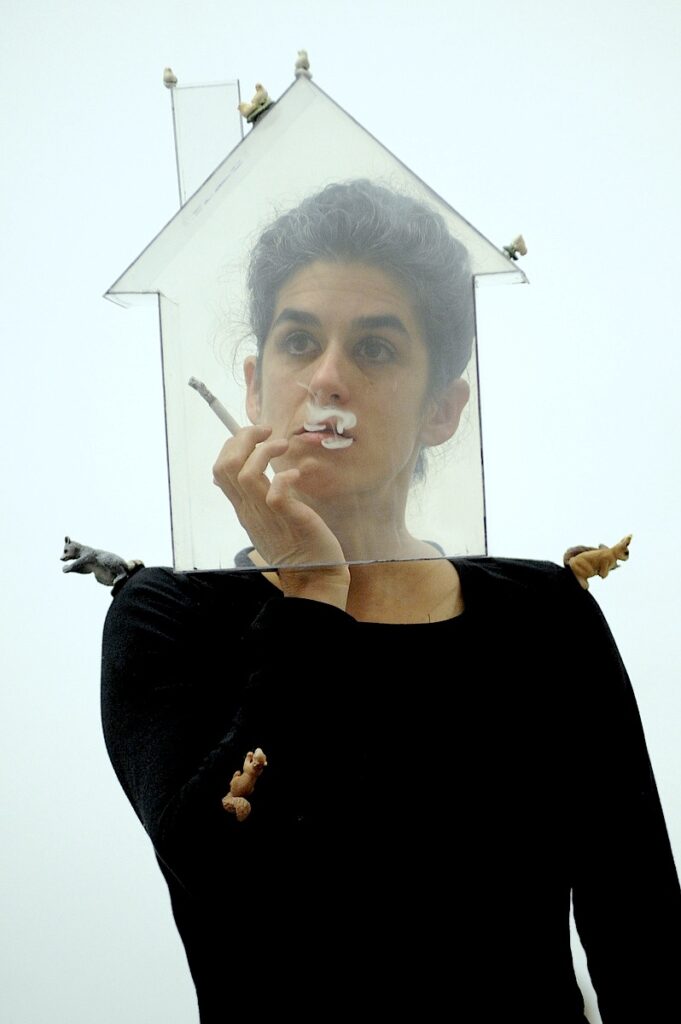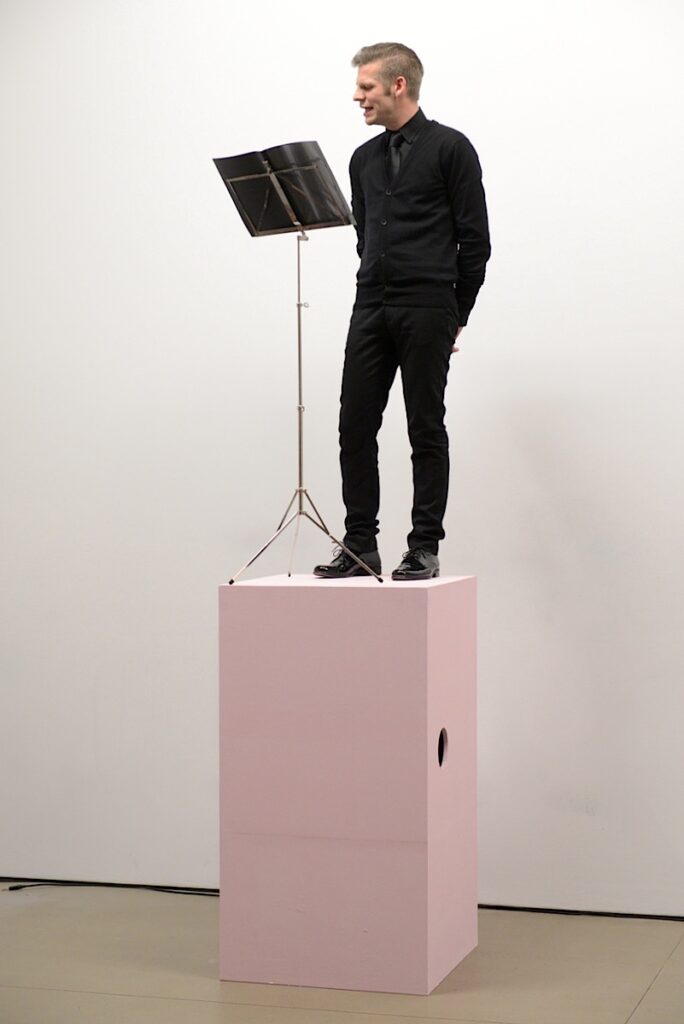By Christine Korte

Let me begin with last tonight’s performances. I’ll start with Rachel Echenberg’s At Home. Wearing a transparent plastic house on her head which framed her face, Echenberg began by delineating spaces in the gallery. A large piece of synthetic turf covering the center of the gallery marked one space, within which the artist then delineated another space: a tiny square of “grass” that demarcated the tiniest possible space required for her to stand and perform in. This square was then cut out and the rest of the turf rolled away. Standing on the square of grass, the artist placed tiny plastic animals and birds on her shoulders and on top of the house – demarcating a distinction between outside and inside. The plastic house framed and contained her face wherein she remained impenetrable and solitary. Echenberg’s process of demarcation, as performed before us, seemed to be about evolving or marking different containers for selfhood – different ways of housing herself: the grass (property), the body, the face – leading up to the question: in which space is the individual at home? Where is the individual (or individuality) housed? The artificiality of the constructed boundaries pointed to the idea that home is ultimately unknowable and in flux.
Echenberg subsequently pulled out a pack of cigarettes and lit one within the impossible strictures of the barely ventilated space around her face. Only a little chimney brought in air. As smoke filled up the house, I felt increasingly anxious – a feeling palpable amongst the audience. The artist then took out a magic marker, drawing a door and windows on the outside of the house. But these vehicles for outside/inside traffic were a ruse in her haze of entrapment. The more vulnerable Echenberg became to the smoke – the more she was suffocating before us with watery red eyes and greying skin – the more she began to look like a Byzantine icon. She looked increasingly poignant and distant – an ungraspable representation of suffering upon which only meditation was possible. Devoid of an entry point.
The idea of home and the slipperiness with which Echenberg engaged the term, reminded me of Freud’s idea of the unheimlich or the uncanny – the idea that something can be strange and familiar at the same time. Furthermore, the heimlich (or homey), happens to also mean secretive in German. Hence, during Echenberg’s performance I thought of the “secrets” housed in the spaces we inhabit, the body particularly, which renders them both inaccessible to ourselves and, ultimately, insufficient containers for selfhood.

Next up was Magnús Logi Kristinsson, who promptly took the stand on an exaggerated podium and recited, alphabetically, the entire Beatles song-title catalogue (taking about 20 minutes to do). Not only did the rhythms stored in the catalogue come alive, taking over Kristinsson’s body with a life of their own, but they also told a story of their own (i.e. “Yesterday”, “You cant do that”, “You know my name”, “You know what to do”). Kristinsson unlocked, it seemed, the hidden and deranged delight of the Beatles – a way of listenting to, and experiencing, the Beatles anew. His work immediately conjured the Merzist sound poetry of Kurt Schwitters, a Dadaist who worked primarily in the 1920s and ’30s. Schwitter’s Merzmusik is a word play on Kommerz, meaning commercial, music – which was about taking commercial fare and sound fragments, tampering and reconstructing them in humourous and absurd ways. This dadaist absurdity is very much the spirit in which Kristinsson performed his wicked bit of sound poetry. He also, of course, alluded to the persistence of a high-art, low-art binary, standing in the conductor’s place on a comically high podium. Here, the everyday content of an alphabetical song catalogue is revealed to be not so every day: compulsive, collect-o-philiac, pathological. In the Beatles’ ubiquity, we’ve overlooked what Kristinsson unlocked last night: song titles that speak to one another, or the list itself as the best raconteur.
